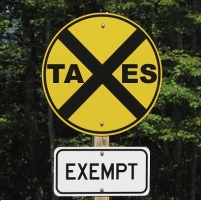IRS Balks at Investigating Tax-Exempt Organizations Accused of Violating Tax Laws
Wednesday, July 04, 2012

Complaints about tax-exempt groups, which have become a mainstay of federal elections, are not being managed or processed efficiently by the Internal Revenue Service (IRS), according to a new report.
The Department of the Treasury’s inspector general for tax administration found that the IRS’ exempt organizations (EO) function needs to do a better job of reviewing 501(c)4 organizations to determine if they are violating federal law.
Prominent examples of 501(c)(4)’s include the Republican-friendly Crossroads GPS and the pro-Obama Priorities USA, as well as churches that support political candidates.
501(c)(4) is reserved for organizations involved in social welfare pursuits. Because this tax-exempt status has been used by groups involved in partisan politics, liberal and conservative opponents have filed requests with the IRS to see if the organizations should lose their standing.
But in order to do this, the IRS has to first find the complaints. The inspector general randomly selected a list of referrals about tax-exempt groups and discovered that 25% of them couldn’t be located by the agency.
The IRS also does not monitor all referrals after receiving them and relies on a database “rife with inaccuracies and omissions,” according to The Hill.
-Noel Brinkerhoff
To Learn More:
IRS Overlooks Reports of Tax-Exempt Organizations Violating Tax Laws (by Michael Cohn, Accounting Today)
Audit: IRS Needs To Better Manage Complaints About Tax-Exempt Groups (by Bernie Becker, The Hill)
Implementing Better Management Controls Would Improve the Exempt Organizations Function’s Ability to Properly Oversee and Timely Process Referrals (Treasury Inspector General for Tax Administration) (pdf)
Tax-Exempt Churches Plan to Engage in Illegal Electioneering (by Matt Bewig, AllGov)
- Top Stories
- Unusual News
- Where is the Money Going?
- Controversies
- U.S. and the World
- Appointments and Resignations
- Latest News
- Musk and Trump Fire Members of Congress
- Trump Calls for Violent Street Demonstrations Against Himself
- Trump Changes Name of Republican Party
- The 2024 Election By the Numbers
- Bashar al-Assad—The Fall of a Rabid AntiSemite






Comments